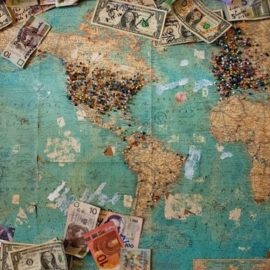

This article is an excerpt from the Shortform book guide to "Enlightenment Now" by Steven Pinker. Shortform has the world's best summaries and analyses of books you should be reading.
Like this article? Sign up for a free trial here.
Is the world more peaceful today than in years past? What do the statistics tell us?
In his book Enlightenment Now, Steven Pinker defends the assertions in his previous book that world violence has declined. He updates the data to show that he was right in 2011 and that he’s still right, as of 2018 when his more recent book was published.
Continue reading to learn why Pinker believes that we’re in an unprecedented time of peace.
World Peace
Is the world more peaceful today? To answer this question, Pinker first refers to his previous book, The Better Angels of Our Nature, to review historical trends and then extends the data to include the seven years between that book and this one. That book showed that, globally, violence has declined by every objective measure. But, he says people have critiqued it, pointing out major episodes of violence that have happened since its publication. Still, he argues that those are blips on the radar and don’t change the overall historical trend, which is that instances of violence are declining globally.
Pinker focuses here on statistics of wars between major world powers. He says that, from the 1500s through the 1700s, major powers were fighting each other 75-100% of the time. War was far more the norm than peace. However, he shows us that between 1800 and the present, less than 25% of the time has been spent in war between major powers. After World War II, we entered what’s called the Long Peace, with no major world wars since. Although wars still break out, Pinker says, they’re no longer the norm.
He says that, since “war begins in the minds of men,” making explicit anti-war policies contributes to fewer wars because people come to see war as unacceptable. The UN Security Council exists for this reason—countries technically can’t wage war on one another without approval from this council. Pinker points out that, for most of human history, that hasn’t been the case.
(Shortform note: Although Pinker would surely remind us that this is an exception that doesn’t negate the rule, it should be noted that since the writing of this book, in February of 2022, Russia launched a military invasion of Ukraine. And this is having global consequences in the form of major disruption in supply chains. The disruption has caused shortages and soaring prices of certain goods, including food. Ukraine and Russia supply a large proportion of the world’s wheat, barley, and sunflower oil, and some experts believe long-term disruption in this supply has the potential to cause widespread famine.)

———End of Preview———
Like what you just read? Read the rest of the world's best book summary and analysis of Steven Pinker's "Enlightenment Now" at Shortform.
Here's what you'll find in our full Enlightenment Now summary:
- How the world is actually getting better, not worse, over time
- Why people think the world is worse off than it is
- What Enlightenment values are and where they come from






